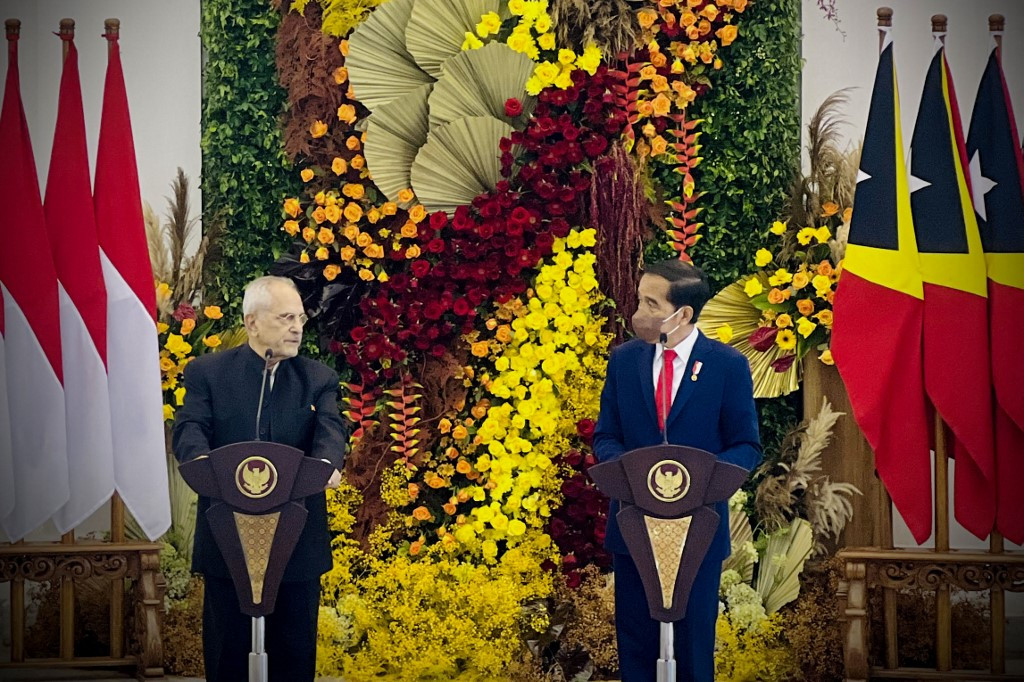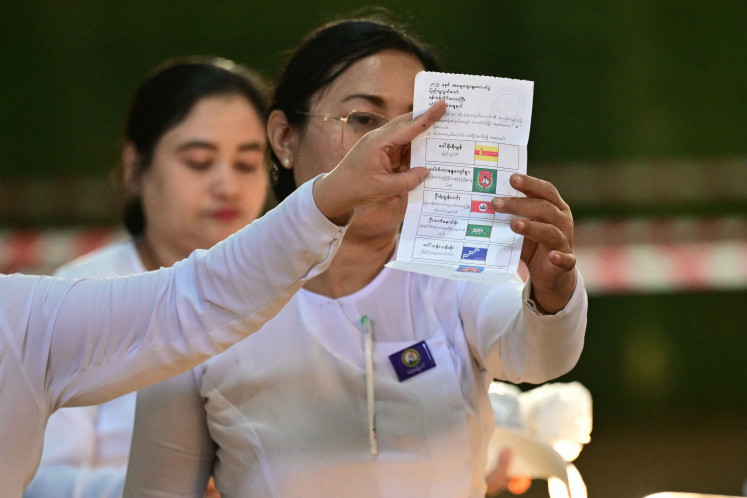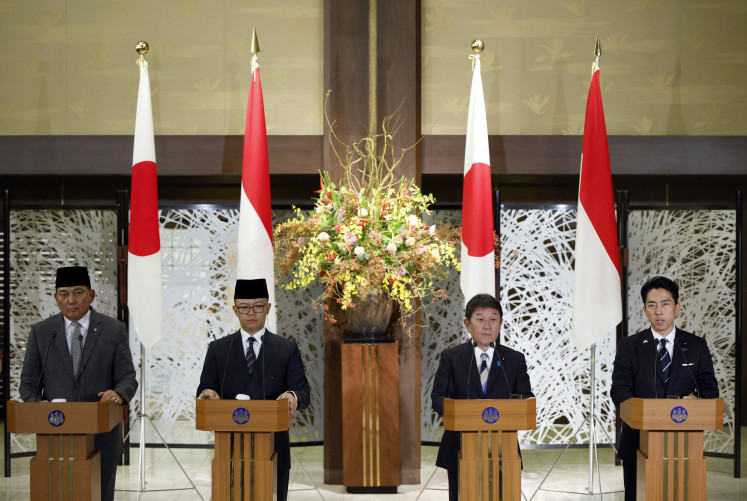Popular Reads
Top Results
Can't find what you're looking for?
View all search resultsPopular Reads
Top Results
Can't find what you're looking for?
View all search resultsTimor Leste’s ASEAN membership: RI’s lifelong debt
President Joko “Jokowi” Widodo was among ASEAN leaders who had consistently convinced fellow regional leaders to accept Timor Leste as part of the group.
Change text size
Gift Premium Articles
to Anyone
A
SEAN has eventually accepted Timor Leste Republic as its 11th member last week after years of debate that included initial reservations from Singapore. The inclusion of the young republic into the regional club looks like Indonesia’s mea culpa confession and fulfillment of its debts to its former colony.
The membership will provide Timor Leste with access to a huge ASEAN market that will help the country grow faster and be part of decision-making processes in the group, whose role is becoming more influential amid the global powers’ rivalry in the region.
For the time being, however, Timor Leste has been awarded an observer status, and with the help of existing ASEAN states will obtain full membership sooner rather than later. Hopefully, when Timor Leste President Jose Ramos-Horta attends the ASEAN Summit that Indonesia will host next year, the country will have secured the coveted status.
President Ramos-Horta had begun Timor Leste’s bid for ASEAN membership in 2011, one year before he completed his first five-year term. Back then, however, Ramos-Horta faced hesitation at home due to the country’s lack of human and economic resources to adapt to ASEAN’s agendas, not to mention financial obligation the group’s members have to pay to run the regional organization. ASEAN, for example, holds hundreds of meetings at various levels annually.
Admission to ASEAN, therefore, is a great achievement for Ramos-Horta who won the 1996 Nobel Peace Prize along with then-Dili bishop Carlos Ximenes Belo for their peaceful campaigns for the independence of East Timor from its colonial master Indonesia.
Inclusion in ASEAN will also give Timor Leste a level playing field within the regional bloc vis-à-vis its former colonial master Indonesia. History shows the turbulent ties between the two nations in the past.
Thousands of lives were lost, from both sides, in rampant acts of violence that marked 24 years of Indonesia’s occupation of then-East Timor. Many more were killed in the aftermath of a United Nations-sanctioned referendum on Aug. 30, 1999, when the East Timorese voted for independence from Indonesia.
Indonesia’s bloody adventure in East Timor began when in December 1975 then-president Soeharto invaded the territory upon full approval of United States president Gerald Ford and Australian prime minister Gough Whitlam after it was abandoned by Portugal, which was controlled by communists.
For more than two decades, Indonesia acted as a colonial master of East Timor and declared it the republic’s 27th province. The UN never recognized Indonesia’s sovereignty of East Timor, thanks in part to the Ramos-Horta global campaign.
Amid the wind of change that led to the fall of Soeharto, his successor BJ Habibie decided to let the East Timor people hold a referendum to choose between independence and staying with Indonesia. Nearly 80 percent of the voters opted for independence.
But the Indonesian military and its militias could not accept the defeat. Hundreds of thousands of people fled their homes to East Nusa Tenggara because the militias, with the backing of the military, destroyed and burned their houses. Peace and order was restored after the UN sent multinational troops and the Indonesian military agreed to cooperate.
Timor Leste was picked as the official name of the new republic that declared its full independence on May 30, 2002. Timor Leste, which shares the Nusa Tenggara Islands with Indonesia, is now among one of the world’s most impoverished nations, but hopes are rife it can free itself from the shackles of poverty thanks in part to its admission to ASEAN.
President Joko “Jokowi” Widodo was among ASEAN leaders who had consistently convinced fellow regional leaders to accept Timor Leste as part of the group. Resistance came from Singapore, which from the beginning had questioned Timor Leste’s readiness and capability to join the trade bloc. The wealthy state feared an impoverished Timor Leste would only become an unnecessary burden for ASEAN.
In fact, ASEAN has admitted new members despite their poor human and economic resources. President Soeharto, as one of ASEAN’s founding fathers, had insisted that all countries in the region, either rich or poor, join ASEAN. Laos and Myanmar were accepted in 1997. Cambodia should have followed suit that year, but due to its domestic politics, its admission was delayed until 1999.
Indonesia, Thailand, Singapore, Malaysia and the Philippines established ASEAN on Aug. 8, 1967, in Bangkok, Thailand. Brunei became the 6th member in 1984, which was followed by Vietnam in 1995.
Indeed, Timor Leste remains a lower-income country, but its well-being is better than Myanmar’s today. Timor Leste’s per capita income stood at US$1,400 last year and is blessed with huge oil and gas reserves, which are estimated at 167.7 million cubic meters or 1.05 billion barrels of oil, condensate and liquid petroleum gas (LPG).
It is a normal standard of procedure for ASEAN to help new members grow like Laos and Myanmar in 1997 and then Cambodia in 1999. The new kids on the block were also granted special treatment in order to catch up with emerging members like Thailand, Vietnam, the Philippines and Indonesia. Timor Leste deserves the same facilities.
To some extent, Indonesia owes its development to the people of Timor Leste. The neighboring nation chose to bury the hatchet, the grievances and the suffering they endured during Indonesia’s occupation for the sake of their future. Indonesia, however, will never be able to repay its obligation to the fullest because some groups in the country remain reluctant to accept the loss of the 27th province and the gross human rights violations that came with it.
As the biggest member of ASEAN, Indonesia, however, should stand ready to help the new ASEAN member grow and prosper. Even if we cannot pay our entire debts to Timor Leste, we can assure them we are forever a good neighbor. President Jokowi has proved Indonesia is.
***
The writer is a senior editor at The Jakarta Post.











